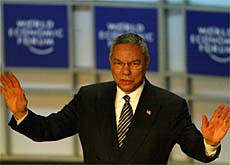War fears overshadowed WEF in Davos

The World Economic Forum summit in Davos has ended after six days of soul-searching dominated by the fear of war in Iraq and its economic consequences.
Security was tighter than at any summit in the WEF’s 33-year history.
Many of the more than 2,000 global business and political leaders who participated in this year’s summit arrived deeply worried about the global recession and the impact of a war in Iraq.
Most were leaving even more worried as the world’s stock markets plunged to new lows earlier in the week.
For many, US secretary of state Colin Powell’s speech explaining the need for action in Iraq was unconvincing.
But by the end of the summit the prospect of war seemed almost a forgone conclusion, despite the anti-war rhetoric of some leaders.
The Swiss president, Pascal Couchepin, opened Davos with a blunt warning to the United States that Switzerland would not support unilateral military action against Iraq.
His comments were followed by a blistering attack from Mahathir bin Mohamad, the prime minister of Malaysia, who lectured the US on why its efforts at “out terrorising the terrorists” would only fuel more terrorism.
Economic malaise
The state of the global economy also contributed to the fatalistic atmosphere.
Switzerland’s contribution centred around business leaders such as Nestlé’s Peter Brabeck, who challenged CEOs to improve their business standards.
“You build up trust for many, many years… and you destroy it in a second,” said Brabeck.
This year’s summit was billed as an opportunity to consign many of the financial disasters of recent years – including Enron and Swissair – to history.
By adopting the theme of trust, Klaus Schwab, the WEF’s founder, hoped to find a remedy for the negativity that continues to grip the world economy.
Corruption highlighted
Mark Pieth, a professor of criminal law at Basel University, said questions of money laundering, accounting rules, corruption and fraud had taken centre stage in Davos.
“Those issues are on the table at the moment… and people here like to focus on them… which I suspect wasn’t the case in earlier years,” Pieth told swissinfo.
“That was the good news programme… and now we’ve got a bad news programme.”
In the past, Davos has acted as a platform for corporate winners to grandstand their success.
When companies such as Enron and WorldCom were flying high, their chief executives hogged the limelight.
This year, the big stars were figures such as Peter Brabeck, Nestlé’s chief executive officer, who has helped the world’s biggest food group to turn out market-defying profits year after year.
Wrong path
Brabeck used his status as one of the WEF’s current success stories to criticise the short-term mentality that dominated and destroyed many businesses during the 1990s.
He took particular aim at the US-led obsession with quarterly earnings, which encourages quick profits over sustainability.
“In the 90s [when we said] we are not going to share any financial targets with the financial world, we were punished like hell,” said Brabeck.
“We were called the most boring and old-fashioned company in the world.”
Many discussions in Davos saw participants question the assumption that shareholder value is the best way to measure the true worth of a company.
Brabeck, among others, called for a broader set of measures – including the value generated by a company for stakeholders, customers and employees.
And he also warned against the dominance of market analysts.
“It starts with the almost pretentious reaction from financial analysts who believe they know what the profit should be for your organisation,” he said.
Little action
But despite all the talk, some participants left Davos wondering whether companies were doing more than just paying lip service to the need for reform.
Pieth said many corporate chiefs in Davos appeared more willing than ever to debate the need for better corporate governance.
However, he warned that many of the real challenges – such as tackling corruption and corporate bribery – were left untouched.
“We should be pushing [corporate leaders] more on the issue of corporate and public accountability,” he said.
Security
The WEF’s 33rd summit also saw the biggest security operation in Swiss post-war history.
Thousands of heavily armed troops and police ensured the summit ran without interruption.
But they also served as a reminder to participants of the uncertainty that hangs over a world very much on the brink of a major Middle East conflict.
swissinfo, Jacob Greber, special correspondent in Davos
WEF boss and founder, Klaus Schwab, criticised the leaders of Germany, France, Britain and Italy for staying away.
Schwab said the WEF summit would be held in Davos next year, but might move to another country in 2005.
He indicated that open debate about war in Iraq would not have been possible if the summit had been held in the US.
The World Economic Forum summit in Davos has ended under a cloud of uncertainty about the coming year.
Worry over the global recession and the potential impact of a war in Iraq dominated the summit, with a number of speakers voicing their preference for a peaceful resolution with Baghdad.
Other issues raised at the summit were money laundering, accounting rules, corruption and fraud.
There were also debates on whether a company’s worth should be measured by shareholder value, with Nestlé chief executive officer, Peter Brabeck, calling for a broader set of measures.

In compliance with the JTI standards
More: SWI swissinfo.ch certified by the Journalism Trust Initiative












You can find an overview of ongoing debates with our journalists here . Please join us!
If you want to start a conversation about a topic raised in this article or want to report factual errors, email us at english@swissinfo.ch.